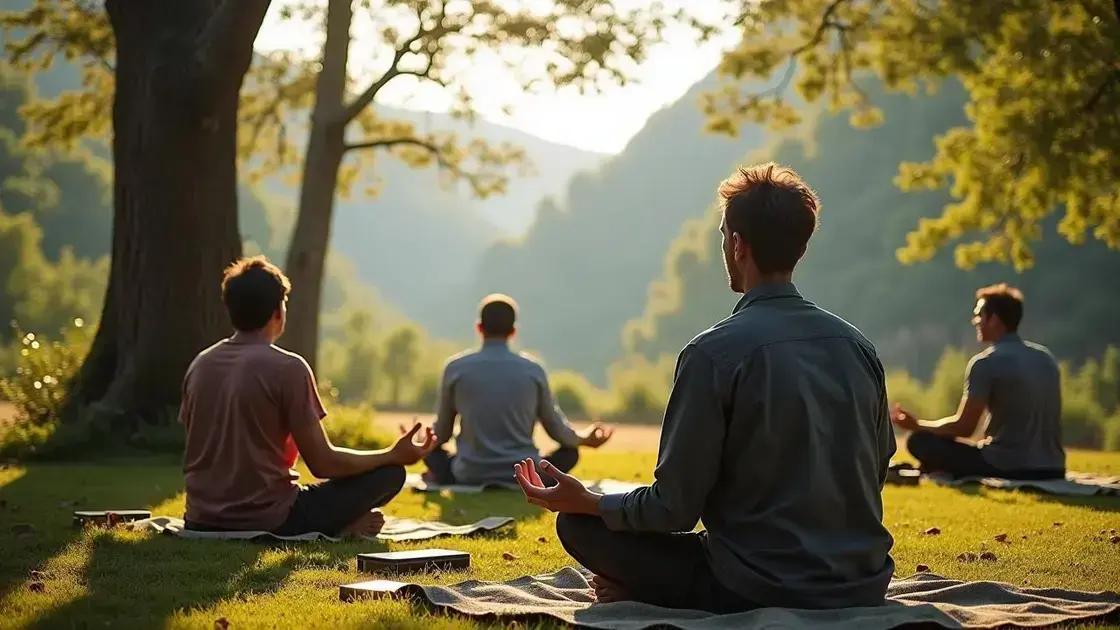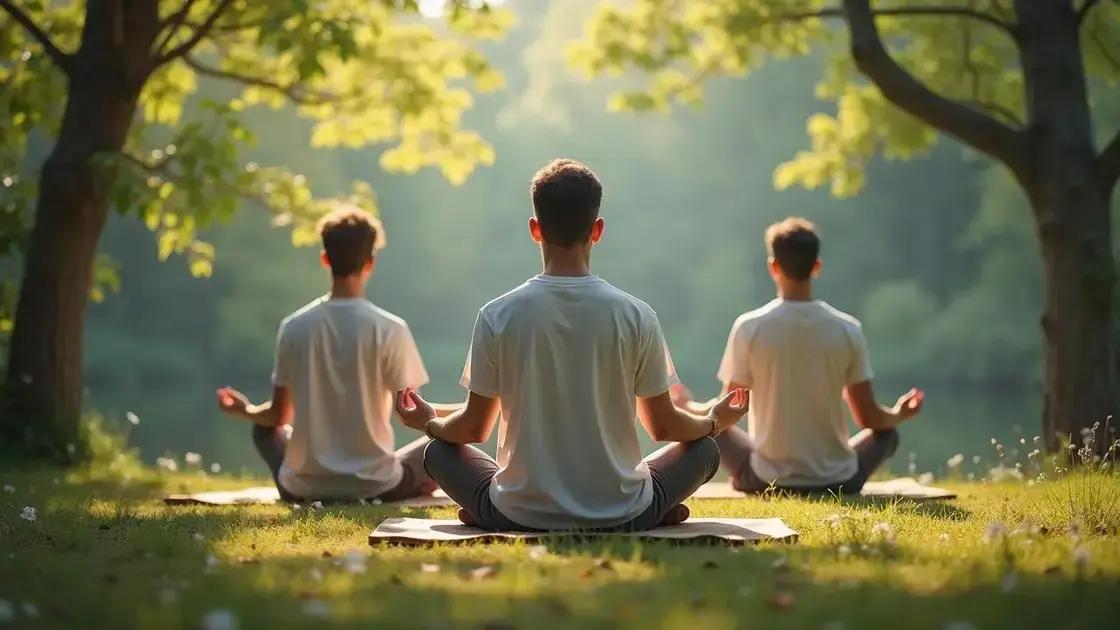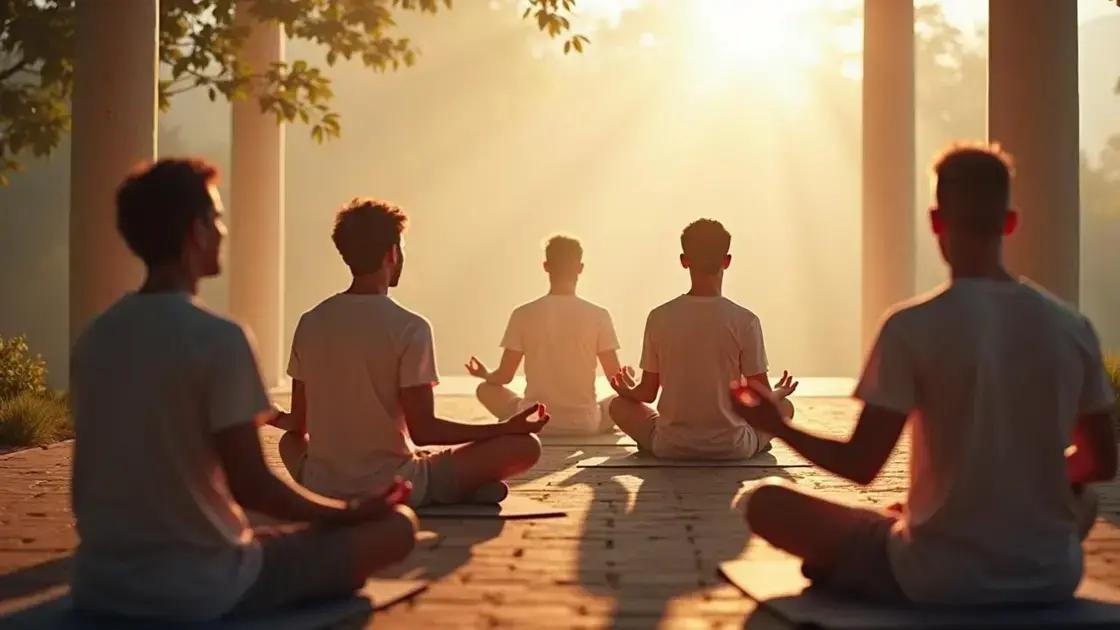Mindfulness retreats offer significant benefits for men’s mental health, including reduced stress, improved emotional regulation, and enhanced self-awareness through various mindfulness techniques like meditation and yoga in a supportive environment.
Mindfulness retreats are gaining popularity as effective solutions for addressing men’s mental well-being. These retreats offer a safe haven for men to explore their feelings, develop coping strategies, and connect with like-minded individuals. Throughout this article, we will discuss the importance of mental well-being for men, what to expect at a mindfulness retreat, the techniques commonly used, and the many benefits these retreats can offer.
The Importance of Mental Well-Being for Men

Mental well-being is essential for every man. It involves emotional, psychological, and social health. Understanding this importance can lead to better life quality. Men often face unique challenges, such as societal expectations that discourage vulnerability. This pressure can lead to stress, anxiety, and depression.
Many men struggle with emotional expression. Research shows that open discussion about mental health can significantly improve well-being. Recognizing the need for help is a crucial first step. Seeking support or professional help should be normalized and encouraged among men.
The Role of Mental Health in Daily Life
Good mental health supports various aspects of life, including relationships, work performance, and overall happiness. When men prioritize their mental well-being, they can engage more fully with their families, friends, and communities.
Breaking Down Stigmas
Addressing mental well-being also involves breaking down stigmas surrounding mental health in men. Conversations about emotions and seeking help should become commonplace. This understanding creates safer spaces for men to express their feelings.
Resources for Men’s Mental Health
There are many resources available today, such as support groups and therapy, specifically geared towards men. Engaging in activities that promote mental health, like mindfulness retreats, can have transformative effects. These retreats provide safe spaces for men to explore their challenges and learn coping strategies.
What to Expect at a Mindfulness Retreat

Attending a mindfulness retreat can be a transformative experience. Each retreat may vary, but many share similar elements designed to promote relaxation and self-awareness.
First, you can expect a peaceful environment. Often set in nature, these retreats provide a quiet space away from everyday distractions. This calming atmosphere helps participants relax and focus on their inner thoughts.
Daily Schedule
Most retreats follow a structured schedule. Each day typically includes guided meditations, mindfulness exercises, and opportunities for reflection. Mornings may begin with yoga or breathing exercises to set a positive tone for the day. Participants are encouraged to step outside their comfort zones.
Group Discussions
Another key aspect is group discussions or sharing circles. These sessions allow men to share their experiences and learn from one another. Building connections with others fosters a sense of community and support. These interactions can be vital for emotional growth.
Personal Reflection
Time for personal reflection is essential. Participants often have quiet hours to journal or meditate alone. This time allows for deeper self-exploration. Many find that writing helps clarify their thoughts and feelings.
Mindfulness Techniques
Retreats also introduce various mindfulness techniques. These may include breathing exercises, visualizations, and body scans. Learning these strategies can help manage stress and anxiety. Many participants leave with practical tools to use in their daily lives.
Techniques Used in Mindfulness Retreats

Mindfulness retreats use various techniques to promote relaxation and self-awareness. These techniques help participants connect with their thoughts and feelings.
One common technique is guided meditation. In this practice, an instructor leads participants through different meditation forms. This helps beginners feel more comfortable and engaged during the session. Guided meditation often focuses on breath awareness or visualization.
Body Scan
Another effective technique is the body scan. Participants lie down and focus on each part of their body, starting from the toes and moving up to the head. This practice encourages deep relaxation and helps participants notice areas of tension.
Mindful Breathing
Mindful breathing is also a key technique. Participants are encouraged to pay attention to their breath, observing each inhale and exhale. This practice helps center the mind and can reduce stress levels, making it easier to stay present.
Movement Practices
Many retreats include movement practices such as yoga or tai chi. These activities combine gentle physical movement with mindfulness. Participants learn to connect their body movements with their breath, enhancing body awareness and emotional balance.
Nature Immersion
Nature immersion is another technique used at mindfulness retreats. Spending time outdoors, whether through hiking or quiet reflection, allows participants to experience calming natural surroundings. This connection to nature can enhance feelings of peace and joy.
Benefits of Mindfulness for Men’s Mental Health

Mindfulness practices offer numerous benefits, especially for men’s mental health. These benefits include reduced stress, improved emotional regulation, and enhanced self-awareness.
One major benefit is reduced stress. Mindfulness helps men become aware of their thoughts and feelings, allowing them to respond rather than react to stressful situations. This shift in perspective can lead to lower anxiety levels.
Improved Emotional Regulation
Mindfulness also encourages improved emotional regulation. By practicing mindfulness, men can learn to observe their emotions without judgment. This skill allows them to manage intense feelings more effectively and make thoughtful choices in their reactions.
Increased Self-Awareness
Another benefit is increased self-awareness. Mindfulness promotes the ability to notice internal thoughts and feelings. This heightened awareness helps men understand themselves better and identify patterns in their behavior.
Better Relationships
Additionally, mindfulness can enhance relationships. By practicing active listening and empathy, men can better connect with others. This leads to improved communication skills and deeper connections with friends and family.
Long-Term Mental Health Benefits
Finally, incorporating mindfulness into daily life can lead to long-term mental health benefits. Regular practice helps build resilience against life’s challenges. Men who engage in mindfulness can experience ongoing improvements in their overall well-being.
In conclusion, the impact of mindfulness retreats on men’s mental health
Mindfulness retreats serve as transformative experiences for men seeking improved mental well-being. By providing a supportive environment, these retreats allow participants to engage in techniques that promote emotional regulation, reduced stress, and increased self-awareness.
The structured activities, including guided meditation and group discussions, foster deeper connections among participants. This sense of community plays a vital role in breaking down the stigma around men’s mental health.
As men adopt mindfulness practices in their daily lives, they can experience lasting benefits, helping them navigate challenges with resilience. Ultimately, mindfulness retreats are an essential step towards fostering a healthier, more balanced mindset.
FAQ – Frequently Asked Questions about Mindfulness Retreats for Men’s Mental Health
What is a mindfulness retreat?
A mindfulness retreat is a structured program designed to help participants engage in mindfulness practices such as meditation, yoga, and self-reflection in a supportive environment.
How can mindfulness retreats benefit men’s mental health?
Mindfulness retreats can reduce stress, improve emotional regulation, increase self-awareness, and enhance relationships, all contributing to better overall mental health for men.
What techniques are commonly used in mindfulness retreats?
Common techniques include guided meditation, body scans, mindful breathing, movement practices like yoga, and nature immersion.
What should I expect when attending a mindfulness retreat?
Participants can expect a peaceful environment, a structured daily schedule including meditation and group discussions, time for personal reflection, and learning mindfulness techniques.
Are mindfulness retreats suitable for beginners?
Yes, mindfulness retreats are designed for participants of all levels, including beginners, and typically include guidance to help newcomers feel comfortable.
How can I incorporate mindfulness into my daily life after the retreat?
You can start by practicing mindfulness techniques learned at the retreat, such as mindful breathing or meditation, and setting aside time each day for self-reflection.













